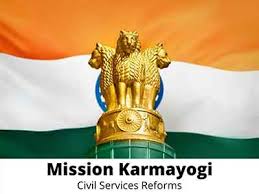
Nagaland Collaborates with Centre to Enhance Civil Services via Mission Karmayogi

 :
| Updated On: 09-Oct-2025 @ 3:32 pm
:
| Updated On: 09-Oct-2025 @ 3:32 pmSHARE
In a major move aimed at modernizing governance and strengthening the skills of state officials, the Government of Nagaland on Wednesday formally signed a Memorandum of Understanding (MoU) with the Capacity Building Commission and Karmayogi Bharat to implement the Mission Karmayogi initiative within the state. This agreement, inked at the Capital Convention Hall, reflects Nagaland’s proactive approach to reforming its administrative system in line with the Government of India’s vision of creating a future-ready, professional, and citizen-centric civil service.
The MoU marks a significant step toward institutional capacity enhancement, focusing on training and skill development for government officers at all levels. By adopting Mission Karmayogi, Nagaland aims to ensure that its administrative machinery is equipped to meet the evolving demands of public service delivery in a fast-changing environment. The Chief Secretary of Nagaland, Sentiyanger Imchen, highlighted the importance of the initiative, noting that Mission Karmayogi, launched by the Government of India in 2020, is designed to foster continuous capacity building among civil servants, enabling them to provide governance that is efficient, transparent, and responsive to citizens.
Mission Karmayogi’s core objective is to create a robust framework for professional development for government officers. The program emphasizes continuous learning and adaptation, providing tools and resources to help officials enhance their managerial, leadership, and technical skills. By integrating these modern learning practices, the initiative aims to instill a culture of innovation, accountability, and professionalism within the state bureaucracy. This, in turn, is expected to improve policy implementation, service delivery, and citizen satisfaction.
A central component of Mission Karmayogi is the iGOT Karmayogi digital learning platform, which offers an extensive range of dynamic learning modules and leadership programs. The platform facilitates learning across different tiers of the administration, enabling officers to acquire skills and knowledge tailored to their roles and responsibilities. It provides access to contemporary governance tools, case studies, and digital resources that equip officers to respond effectively to emerging challenges in public administration. By leveraging technology, the platform ensures that training is accessible, continuous, and customized according to the needs of individual officers.
During the signing ceremony, Chief Secretary Imchen emphasized that the collaboration between Nagaland, the Capacity Building Commission, and Karmayogi Bharat demonstrates the state’s strong commitment to improving institutional efficiency and promoting innovation within its administrative framework. The initiative is not only about skill development but also about fostering a professional, accountable, and citizen-focused bureaucracy that can meet the complex demands of modern governance.
The MoU signifies a long-term partnership aimed at cultivating a culture of continuous learning and professional growth among civil servants in Nagaland. By integrating Mission Karmayogi into the state’s administrative structure, Nagaland is aligning itself with national efforts to standardize training and capacity-building programs, ensuring uniformity, efficiency, and a forward-looking approach across the civil services.
In conclusion, Nagaland’s adoption of Mission Karmayogi represents a comprehensive and forward-thinking step in public administration reform. Through structured capacity-building programs, digital learning platforms, and strategic collaboration with national institutions, the state seeks to empower its officials with the skills, knowledge, and tools required to deliver effective, transparent, and citizen-centric governance. This initiative underscores Nagaland’s commitment to professionalizing its bureaucracy, embracing innovation, and preparing its civil services to address the challenges of the 21st century efficiently and responsibly.